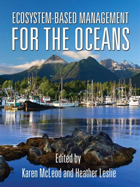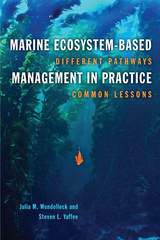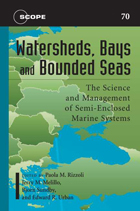
California’s experience provides a rare opportunity to learn from a collaborative public process involving private interests and science-intensive decisions. Determined to do just that, Steven Yaffee, a renowned expert on negotiation and collaborative decision making, spent hundreds of hours researching the MLPA process in an effort to understand how California succeeded where other efforts have failed. The result is Beyond Polarization, a highly readable insider’s perspective on complicated decision-making processes and the strategic choices necessary for success. The book follows the initiative process region by region, each with its unique stakeholders and geographic concerns. These lessons can be applied to similar collaborative processes across the country and world.
Beyond Polarization presents an optimistic message about the public policy process in a time of civic division. It offers reassurance that, by using proven decision-making processes, policymakers, scientists, and local citizens can successfully collaborate to manage and protect natural resources we all have a stake in.

At its core, ecosystem-based management (EBM) is about acknowledging connections. Instead of focusing on the impacts of single activities on the delivery of individual ecosystem services, EBM focuses on the array of services that we receive from marine systems, the interactive and cumulative effects of multiple human activities on these coupled ecological and social systems, and the importance of working towards common goals across sectors. Ecosystem-Based Management for the Oceans provides a conceptual framework for students and professionals who want to understand and utilize this powerful approach. And it employs case studies that draw on the experiences of EBM practitioners to demonstrate how EBM principles can be applied to real-world problems.
The book emphasizes the importance of understanding the factors that contribute to social and ecological resilience —the extent to which a system can maintain its structure, function, and identity in the face of disturbance. Utilizing the resilience framework, professionals can better predict how systems will respond to a variety of disturbances, as well as to a range of management alternatives. Ecosystem-Based Management for the Oceans presents the latest science of resilience, while it provides tools for the design and implementation of responsive EBM solutions.

Marine Ecosystem-Based Management in Practice is the first practical guide for the marine conservation realm. In a unique collection of case studies, the authors showcase successful collaborative approaches to ecosystem-based management. The authors introduce the basic concepts of ecosystem-based management and five different pathways for making progress from community to multinational levels. They spotlight the characteristics that are evident in all successful cases —the governance structures and social motivations that make it work. Case analyses ranging from the Gulf of Maine to the Channel Islands in Southern California comprise the bulk of the book, augmented by text boxes showcasing examples of guiding documents important to the process. They devote several ending chapters to discussion of the interpersonal relationships critical to successful implementation of marine ecosystem-based management. The book concludes with a discussion of the implications for policy and on-the-ground practice.
This book offers a hopeful message to policy makers, managers, practitioners, and students who will find this an indispensable guide to field-tested, replicable marine conservation management practices that work.

With marine ecosystems endangered by a warming climate and exploding human population growth, a critical transformation is taking place in the way the world's ocean resources are managed. Marine Ecosystem-Based Management presents a state-of-the-art synopsis of the conservation approaches that are currently being translated from theory to action on a global scale. With contributions from an international team of experts, this volume synthesizes the scientific literature of holistic practices in ecosystem-based management (EBM), focusing on protecting the marine ecologies that humans and countless other organisms vitally depend upon.
Human uses of ocean ecosystems have usually been divided into separate sectors--fisheries, transportation, tourism, and recreation, for example--and ecosystem boundaries defined as much by politics as geography. This approach is giving way to a broader strategy based on integrated management of human activities in scientifically identified regions of the marine environment. Spanning a range of issues from the tropics to the poles, the authors present analyses of open ocean systems and high-impact regions such as coastlines, coral reefs, and estuaries. Methods of modeling and evaluating marine EBM are explored, as well as the role of governmental and other regulatory frameworks in ocean management and the lessons to be learned from past ecological interventions.
It is now widely recognized that any viable strategy for sustaining the world's oceans must reflect the relationships among all ecosystem components, human and nonhuman species included. Marine Ecosystem-Based Management is an in-depth report of new advances in the rapidly evolving discipline of coupled Human-Ecological Systems.

Watersheds, Bays, and Bounded Seas provides state-of-the-science information about these complex systems and identifies best management practices to preserve them. With contributions by natural and social scientists, the book examines both the political and biophysical forces affecting semi-enclosed marine systems.
SEMS comprise a substantial portion of the coasts—areas with high population density—and we rely on them for often-competing services such as navigation and transport, disposal of waste, provision of food, extraction of minerals, and leisure. The book describes how human activities could irrevocably alter these fragile ecosystems, exploring threats from runoff to climate change. It also addresses the unique challenges of managing SEMS, including cooperation between multiple nations.
READERS
Browse our collection.
PUBLISHERS
See BiblioVault's publisher services.
STUDENT SERVICES
Files for college accessibility offices.
UChicago Accessibility Resources
home | accessibility | search | about | contact us
BiblioVault ® 2001 - 2024
The University of Chicago Press









